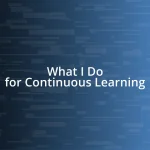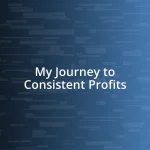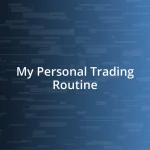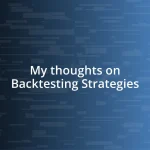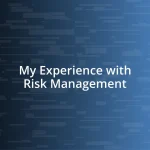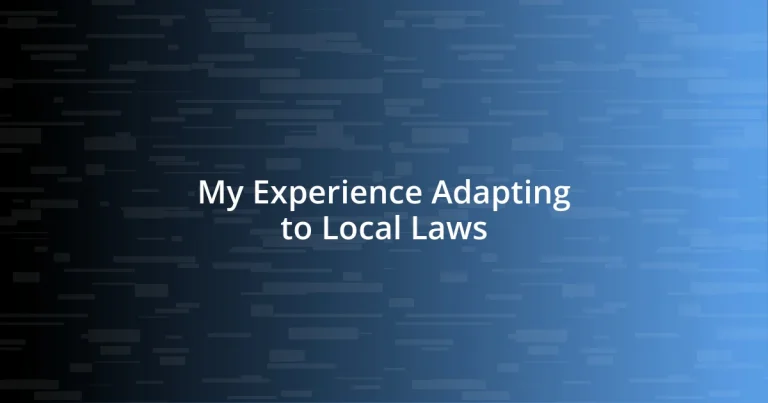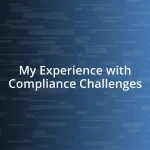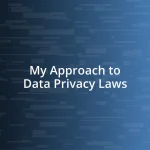Key takeaways:
- Understanding local laws requires awareness of cultural nuances and community values, fostering a sense of belonging beyond mere compliance.
- Proactively engaging with local experts and resources—such as community forums, government offices, and legal professionals—can make navigating regulations more manageable and insightful.
- Documenting personal experiences and sharing lessons learned not only reinforces understanding but also builds a supportive network, turning legal challenges into collaborative journeys.
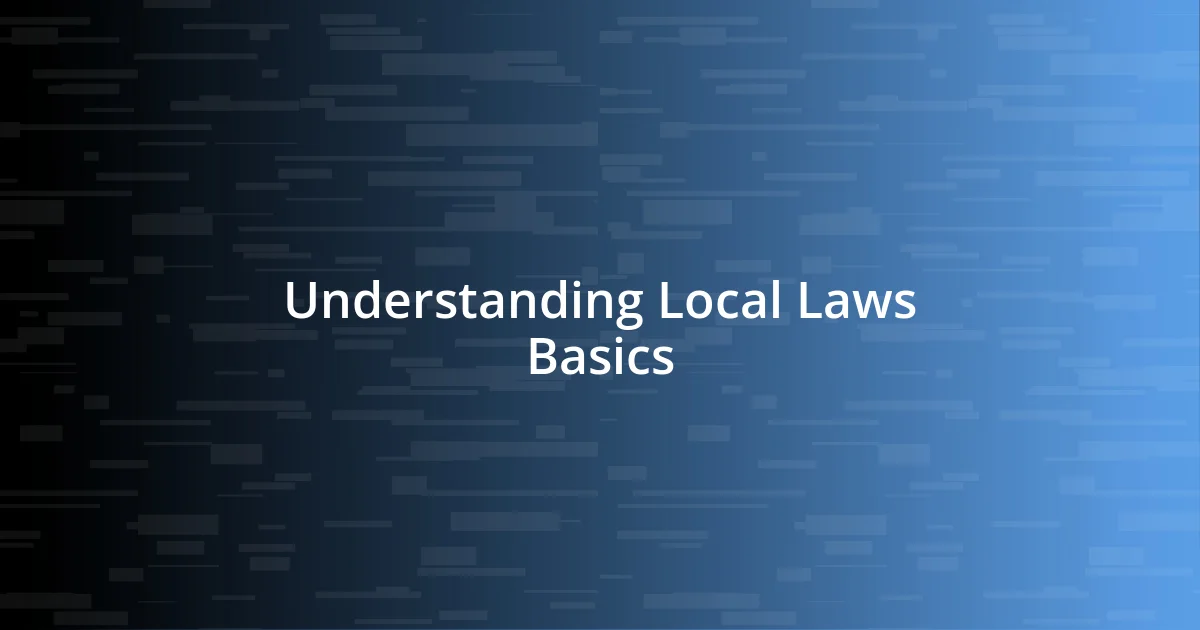
Understanding Local Laws Basics
Understanding local laws isn’t just about memorizing statutes; it’s about grasping the cultural nuances behind them. I remember my first encounter with local housing regulations when I moved to a new city. The rules felt like a maze, and I often asked myself, “Why does it have to be so complicated?” Exploring this complexity opened my eyes to how rooted each law is in the community’s history and values.
One thing I learned is that local laws can vary widely even within the same country. For instance, zoning laws are often tailored to each neighborhood’s character—what works in a bustling urban center might not apply in a quiet suburb. It was an eye-opener for me when I discovered that my quaint new neighborhood had restrictions on fencing. I found myself thinking, “This isn’t just a smart way to maintain the area’s charm; it’s a way of preserving community ties.”
When approaching local laws, I find it crucial to ask questions and seek guidance from locals or legal experts. This proactive approach can save you not only time but also potential frustrations. I remember sitting down with a local lawyer who patiently explained the ins and outs of business permits. It made me realize that understanding the basics goes beyond compliance—it’s about fostering a sense of belonging in a new place.
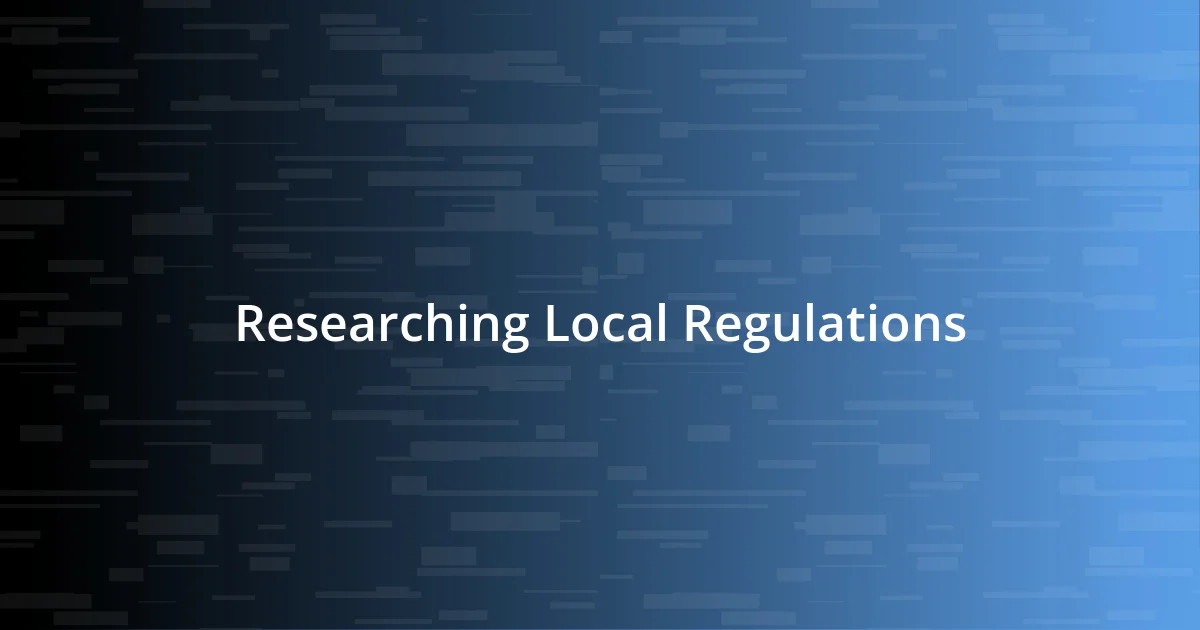
Researching Local Regulations
Researching local regulations can feel overwhelming, especially if you’re new to an area. I vividly recall the hours I spent online poring over various municipal websites, trying to pinpoint the specifics for starting my home-based business. It was like trying to find a needle in a haystack! However, as I delved deeper, I stumbled upon a local community forum that offered invaluable insights. Fellow residents shared their experiences navigating local regulations, which made my research much more manageable and less daunting.
I also discovered the importance of connecting with local government offices. A phone call to a zoning department led to a surprisingly informative conversation. The representative not only clarified my misinterpretations but also directed me to resources I hadn’t come across before. This experience reinforced my belief that personal engagement can sometimes yield better results than endless searching online. Sometimes, tapping into human experience can illuminate the path and provide guidance that written regulations can’t always convey.
It’s not just about gathering information, though; it’s about understanding the implications of those regulations on your life and aspirations. When I applied for a business license, I learned the hard way about the nuances of local health regulations. The forms were straightforward, but the real challenge came when I realized some requirements shifted based on local interpretations. It was a lesson in adaptability; the regulations aren’t just rules—they reflect the locality’s unique character and priorities.
| Resource Type | Benefits |
|---|---|
| Online Research | Quick access to regulatory information; can be overwhelming |
| Community Forums | Real-life experiences; practical tips |
| Local Government Offices | Direct answers; personalized guidance |
| Legal Experts | Professional insight; clarity on complex regulations |
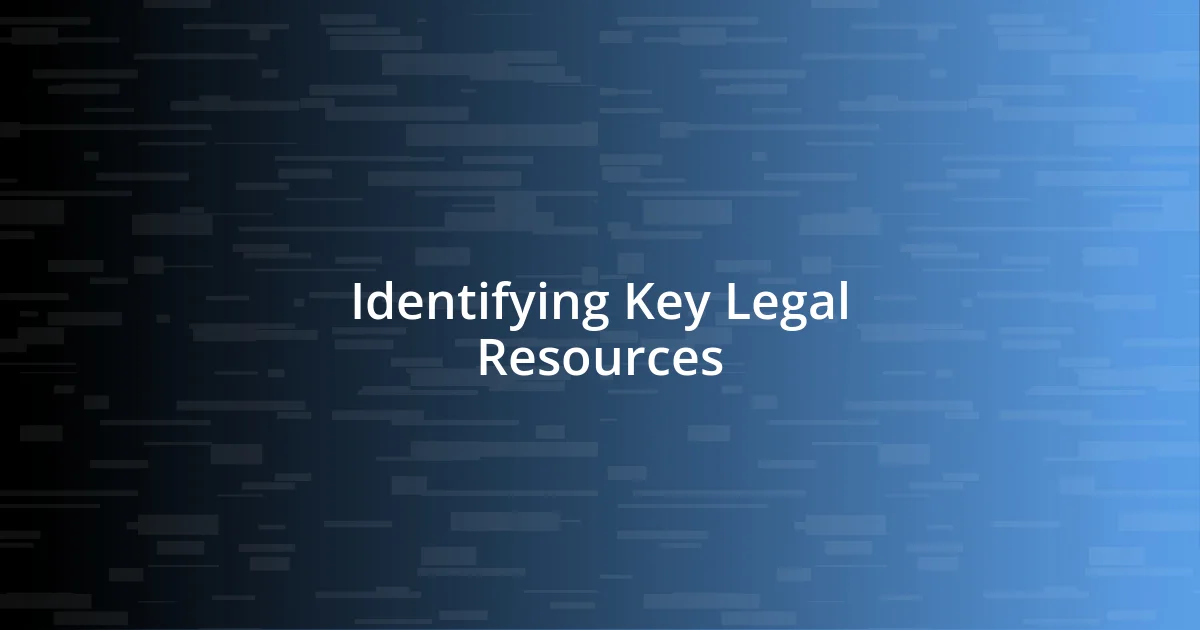
Identifying Key Legal Resources
Identifying key legal resources is essential for anyone adapting to local laws. During my journey, I found that networking and building relationships with local experts made all the difference. One afternoon, I attended a neighborhood meet-up where I struck up a conversation with a retired city planner. He shared anecdotes from his career that not only clarified complex regulations but also enhanced my appreciation for the community’s development history. His insights were invaluable, and I left feeling enriched, like I had uncovered a hidden treasure of knowledge.
To streamline this process, consider these essential legal resources:
– Online Research: Quick access to information, though it may feel overwhelming at times.
– Community Forums: Platforms for real-life experiences and practical tips from locals who have faced similar challenges.
– Local Government Offices: Ideal for obtaining direct answers and personalized guidance from knowledgeable staff.
– Legal Experts: Professionals who can offer clarity on complex regulations, often simplifying what seems daunting.
– Networking Events: Opportunities to connect with residents and experts, fostering relationships that can be beneficial for ongoing support.
Embracing these resources truly transformed my approach to understanding the local legal landscape.
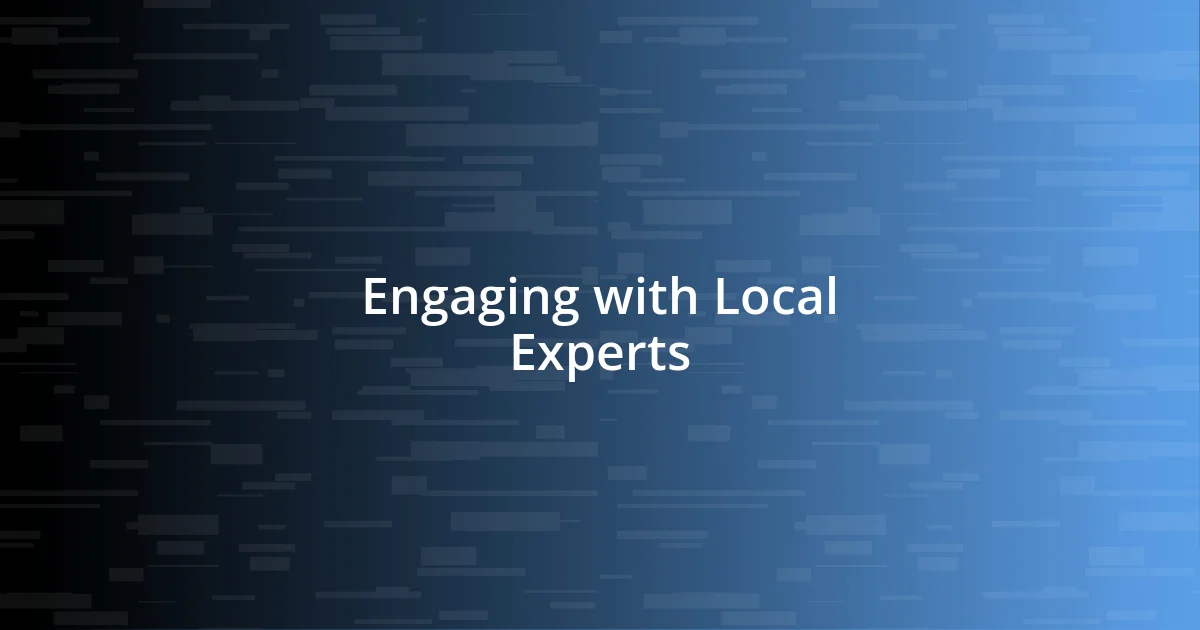
Engaging with Local Experts
Engaging with local experts can create a profound shift in your understanding of regulations. I remember the first time I reached out to a small business mentor at a local chamber of commerce. Her warmth and willingness to share her experiences put me at ease, and I could feel my anxiety melt away as we talked. It was more than just a conversation; it was like having a personal guide through the maze of local laws.
Attending workshops hosted by local experts has also been a game changer for me. At one particularly memorable event, an attorney specializing in small business law led discussions on compliance that were both enlightening and relatable. I thought, “How did I not know this sooner?” Listening to his anecdotes about common pitfalls and triumphs helped me realize that others have faced similar challenges. It’s this shared knowledge that can really fill in the gaps many of us encounter when navigating legal waters.
I learned that engaging with local experts doesn’t just provide information—it builds a support network. On several occasions, I reached out to people I met at various events for a quick question or two, and they were more than willing to help. This sense of community made me feel connected and supported, turning what initially felt like an isolating journey into a shared experience. I often wonder how different my path would have been without these interactions; their insights turned complicated legal jargon into something comprehensible and even empowering.
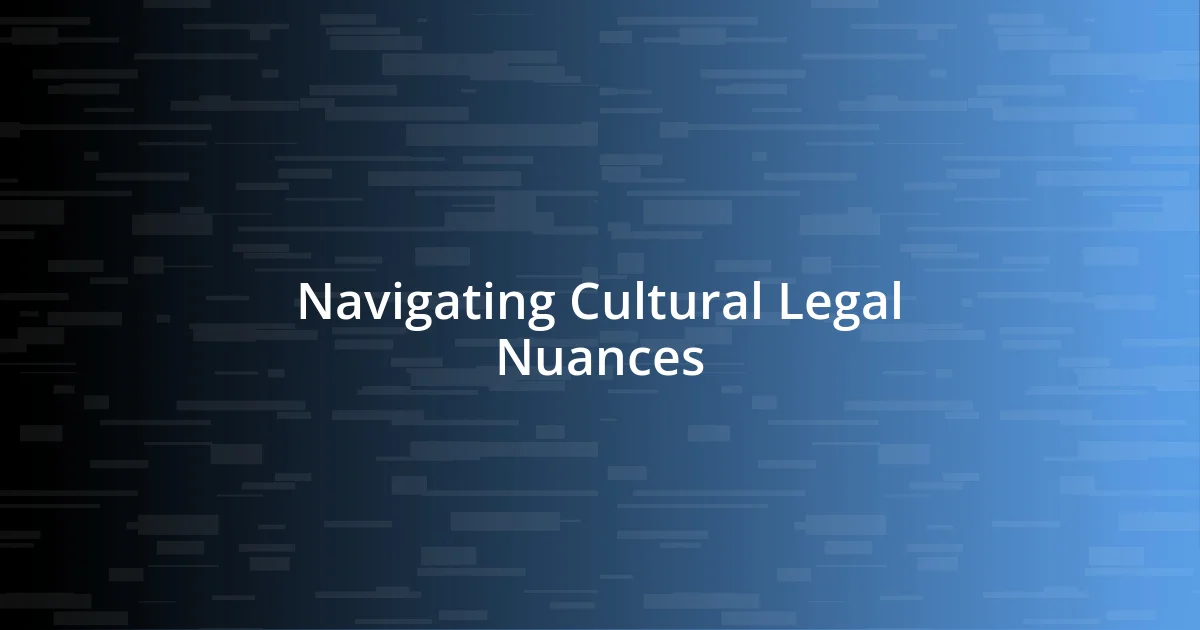
Navigating Cultural Legal Nuances
Navigating cultural legal nuances requires sensitivity to the local context. I vividly recall my first encounter with a neighborhood regulation that seemed trivial but carried significant cultural weight. It was regarding community gatherings in public spaces. What I initially thought was just an annoying restriction turned out to be deeply rooted in the community’s values of preserving peace. Understanding this connection helped me adapt. I learned the importance of viewing laws through the lens of local culture and history rather than just as rules.
When I immersed myself in community activities, I discovered how local customs influenced legal interpretations. One weekend, I volunteered at a community clean-up, where I struck up a conversation with a few residents about local zoning laws. Their perspectives revealed how different communities view property use, reflecting not just legality but tradition and heritage. It made me realize that understanding these nuances can turn legal complications into cooperative opportunities rather than barriers. How often do we consider that laws are not just black and white, but colored by the cultural experiences of those who live by them?
I also recall a moment at a town hall meeting where I hesitated to voice my concerns about local business regulations. Overcoming my fear, I eventually shared a suggestion about improving accessibility for small business owners. The response was overwhelmingly positive, indicating that local laws are often shaped by community input. This experience reinforced my understanding that engaging with cultural legal nuances isn’t just about compliance; it’s about mutual respect and collaboration. Have you ever considered how your voice, shaped by your experiences, could contribute to positive legal adaptations in your community?
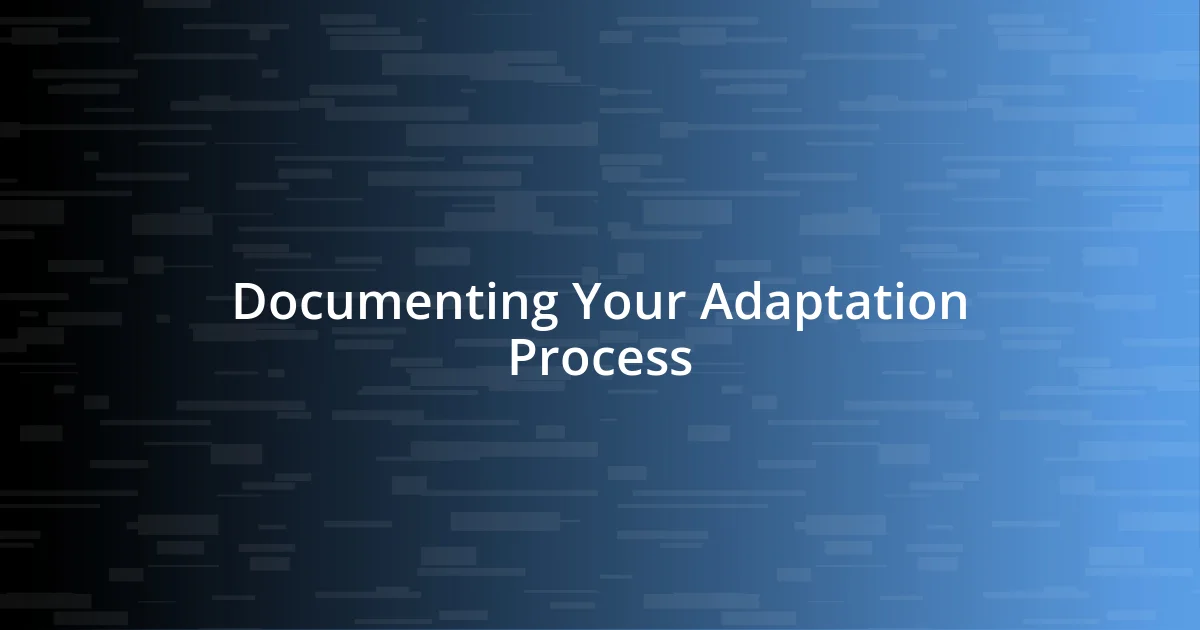
Documenting Your Adaptation Process
Documenting my adaptation process became a valuable tool in understanding local laws. I began by keeping a detailed journal of my experiences, noting each regulation I encountered and how I interpreted it. This practice not only clarified my thoughts but also highlighted my evolving perspectives on compliance, which sometimes felt overwhelming. Reflecting on my early entries, I can see how my confidence grew as I navigated each hurdle—like when I successfully applied for a local business license that initially seemed daunting.
Photos and screenshots became essential as I documented meetings, workshops, and even informal discussions with local residents. One particular photo remains a favorite: it captures a group of us brainstorming solutions to a new ordinance. I still remember the blend of raw enthusiasm and uncertainty in that room; we were all equally eager to adapt while grappling with our individual fears of change. It was in those moments that I realized this adaptation journey was less about the logistics of laws and more about the community bonds we formed, reminding me that we’re never truly alone in this process.
Looking back, I sometimes wonder how effectively I documented those early days. Would I have benefitted from more structured notes instead of a casual journal? However, I believe that capturing my initial feelings and experiences made the journey more personal and relatable. Now, I encourage others to find their own documentation style, whether through blogs, social media, or traditional journals. Each entry reflects progress, not just in understanding laws but in fostering resilience and adaptation—something I wish I had embraced sooner.
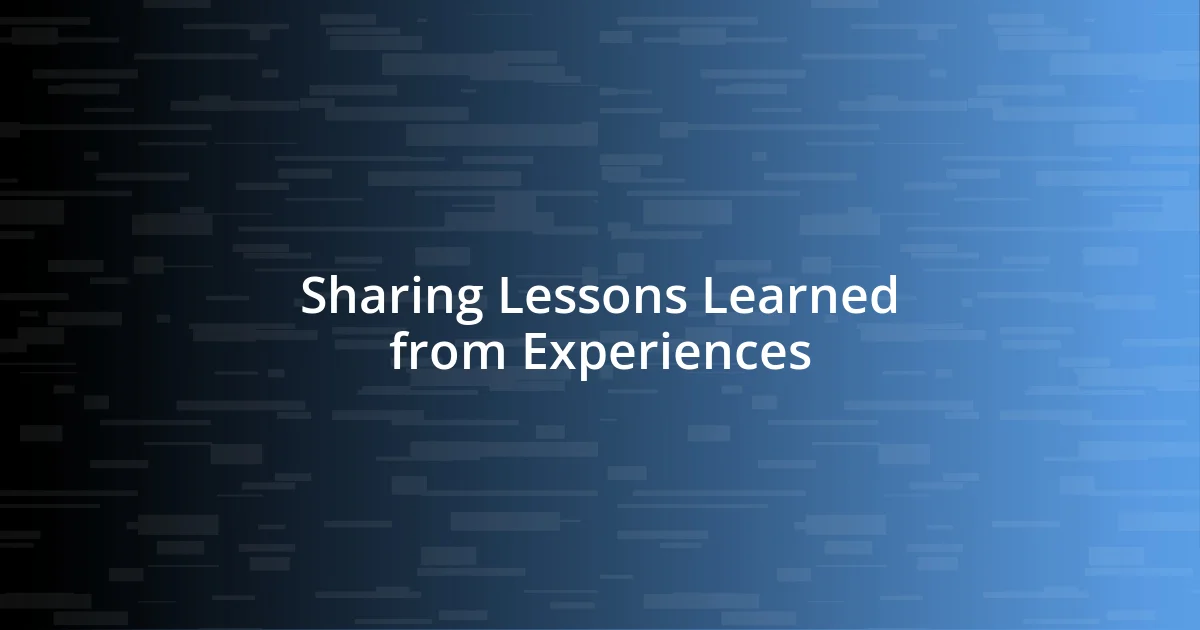
Sharing Lessons Learned from Experiences
Sharing lessons from my experiences has been eye-opening, especially in grappling with local laws. I remember a specific instance when I faced a language barrier while attending a legal workshop. Initially frustrated, I realized that asking a friendly participant for clarification led to a vibrant conversation about the law’s implications. This taught me that reaching out for help not only deepens understanding but often forges connections that enrich the community.
Through my journey, I’ve learned the power of empathy in navigating legal landscapes. At a community event, I met a local entrepreneur who struggled with business regulations. Listening to her story illuminated how laws can seem like towering obstacles to those without resources. This experience underscored for me that sharing our struggles and victories creates a supportive network, transforming daunting legal challenges into shared journeys of adaptation. Have you ever found a lesson hidden within someone else’s experience?
I also found that celebrating small victories kept my motivation alive. After successfully navigating a local environmental regulation, I hosted a small gathering with friends to discuss what I learned. Their enthusiasm was contagious, and I felt a sense of accomplishment that went beyond just following the law. This moment reminded me that the process is not just about the end goal; it’s the collective appreciation of every step we take that enriches our journey. So, how do you celebrate your achievements in adapting to local laws?

